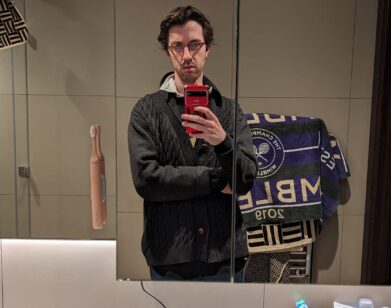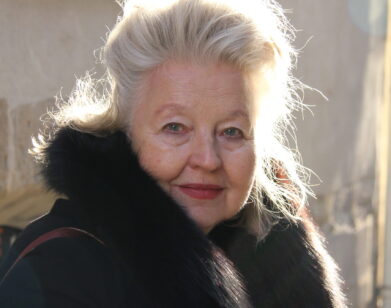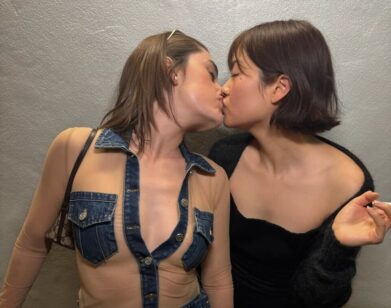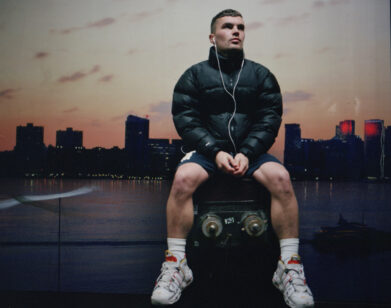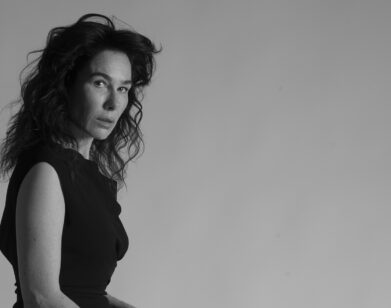DIRECTORS
Ari Aster and Halina Reijn Think This Interview Might Start a Cult
Famously, the director Ari Aster isn’t so comfortable with the conventions of modern-day movie promotion. Press junkets, magazine profiles, cutesy interviews with teenage TikTok stars—Aster would rather be on a movie set. But last week, when he got on a Zoom call with fellow filmmaker Halina Reijn, he wasn’t a tortured genius, as he’s so often characterized, but simply a man talking to his friend about the vagaries of writing and directing. “In the beginning, I find it almost impossible to deal with a blank page,” said Aster, whose fourth feature, Eddington, an unhinged neo-Western set in the dark days of COVID lockdown, landed in theaters earlier this month. On set, however, “something in me kicks into gear and I’m not thinking,” he says. Autopilot, it seems, has served Aster well. Since his explosive 2018 debut with Hereditary, the 39-year-old director has gone onto to make a series of progressively twisted and uncompromising films, including Midsommar and Beau Is Afraid. “I’m always shocked that I’ve been given the opportunity again,” he told Reijn, who made her own foray into directing with last year’s psychosexual thriller Babygirl. Below, the two filmmakers get together for a wide-ranging conversation about power, genius, cults, and spirituality.
———
HALINA REIJN: The thing says we’re being recorded.
ARI ASTER: How long have you been in Amsterdam? You haven’t been here in a while.
REIJN: Because I was in New York for two days. My mom broke her hip.
ASTER: Oh.
REIJN: Yeah. She’s doing way better. She’s already out of her bed. But when you break your hip when you’re that old, it’s really dangerous, apparently. I didn’t know this.
ASTER: When are you heading back?
REIJN: Is this off the record or on the record? I’m doing sort of a commercial thing in L.A. for three weeks, so I’m leaving Monday. Anyway, it’s going to be a whole thing. But after that, I think I’ll go back to New York. But everybody is in Europe vacationing. Are you going to go on vacation at all?
ASTER: No, you know I don’t go on vacation.
REIJN: You never know. I’ve been on vacations with you. I’ve seen you in the sun. I’ve seen you interact with fish in the water.
ASTER: No, no, no, no. That’s not…
REIJN: Well, there’s still work to do, yeah? This is me and you doing part of your movie promotion?
ASTER: This is part of the promotion.
REIJN: I saw you and Emma [Stone] doing really funny little bits on my Instagram. Do you enjoy any of it?
ASTER: Every morning that I have to do it, I remind myself that I should find a way to enjoy it and I should take full advantage, but I don’t know.
REIJN: Find pleasure in it. I don’t know what you and Emma were doing exactly, but it looked really fun. I had a good time watching it.
ASTER: Well, that was another instance of something that, in retrospect, you might recognize was supposed to be fun, but in the moment it’s just mortifying and embarrassing.
REIJN: It’s embarrassing because you have to sell something, and it feels a little weird because you made it with all your heart. But now you have to kind of say, “Hello, do you like my baby?”
ASTER: And the camera and the microphone are very threatening. You go in saying, “I’m just going to let it rip,” and then somebody says, “Okay, we’re recording,” and it’s like, “Well, good luck with that.”
REIJN: When you did that for the first time, the interviews and cameras in your face, did you look at actors in a different way or no?
ASTER: I think that’s when I realized just what a sickness it is to be an actor.
REIJN: I agree with that, but extend.
ASTER: Oh, just whatever that impulse is to have what you do be recorded for posterity. I envy it and I love actors, with exceptions.
REIJN: There’s some exceptions here and there. But I do agree with you that I think acting is total torture, even though I did it for the most part of my life. But of course if you’re an actor, it doesn’t feel like, “Point the camera at me! I want to be seen!” It feels like, “I can’t do anything else, so I guess I’m doing this.”
ASTER: Well, you’re obviously uniquely equipped to work with actors because you’re not only an incredibly experienced actor, but also a very, very famous one. You’re basically the most famous woman in Amsterdam.
REIJN: So famous, in the smallest country in the world. Can I ask you a really childish question? You’re going to hate this, but I don’t care. When did you know that you wanted to make movies?
ASTER: Oh, it’s hard to trace. Basically, the answer is I’ve wanted to make movies as long as I’ve been able to want to do anything. I don’t remember an epiphany. I was introduced to movies very early on and at that point that’s all I cared about. I was just completely mesmerized. It first manifested as a desire to act because all I could see were the actors and I thought, “Harrison Ford made Raiders of the Lost Ark so I want to do that.” And then I gradually became aware—
REIJN: That he didn’t make that movie. That’s funny. So how old do you think you were when you saw your very first film?
ASTER: I have some vague but vivid memories of being taken to a theater and being terrified. I remember it being Dick Tracy, which is a horrifying film because everybody’s in pounds of makeup and it’s a really grotesque world. Anyway, it drove me insane and terrified me and I had to go back. I remember seeing Goodfellas for the first time. I remember seeing Raising Arizona and being distinctly aware of those films feeling different and being really interested in why they felt different. And I think that’s where I became fascinated by the idea of what it would mean to make one of these things. What about you? When did you decide to be a director?
REIJN: A little bit similar. I grew up off the grid so we didn’t have any TV, no moving images, nothing. We had a babysitter. She was bored, because we didn’t have any toys, so she took us to the cinema. I was six and I saw Annie and I thought that actress, Aileen Quinn was her name, made that movie. So I thought, “I need to be her and then I can make that film.” And only way later did I find out that actors are only the very last stage of moviemaking. At that point, I decided to become an actor, but I always felt somewhere that I wanted to create the story myself. So very late, I switched from being the puppet to the puppeteer.
ASTER: How do you like being the puppeteer?
REIJN: Well, I still feel I’m also the puppet. I think I’m very collaborative, but I do feel I’m the puppeteer when I’m writing. What do you prefer? The writing or being on set?
ASTER: Oh, I find writing to be a grind until it’s really moving, then it becomes kind of a joy. But in the beginning, I find it almost impossible to deal with a blank page. Even if it’s terrible, I’m able to start enjoying that process once I have a first draft. But I don’t know how I ever get there because I really hate getting there. And then being on set, once I’m there, I feel that I’m in my element. Something in me kicks into gear and I’m not thinking. Waking up in the morning and going to set is just awful. Every time, it feels like a funeral march. The way people look to you for answers, it’s just terrible.
REIJN: Why is that feeling so terrible?
ASTER: It’s just stressful. But once you’ve provided the answers, you can breathe again.
REIJN: And it feels kind of lonely, no? Because of course you’ve carried around this whole idea for a long time and you’ve shaped it and it’s so important to you. But now you have to execute it and everybody’s asking, “Do you want red or blue?”
ASTER: You have to find the rhythm. But when you’re first faced with it, there’s something threatening about it. Have you seen Airplane!?
REIJN: No.
ASTER: You haven’t seen Airplane!? The [David] Zucker movie? Anyway, in the beginning the guy is coming to work at the airport and there’s Jehovah’s Witnesses and different people with pamphlets coming up to him and he punches them all out. I always think about that when I first arrive to set, just that I’m going to have to punch everybody out of my way.
REIJN: It’s true. Do you get better at it now that you’ve done a couple of these big movies?
ASTER: I’m able to steel myself more, yeah. I’m more used to it, but there’s just something defensive that kicks in when I first arrive on set and I avoid eye contact for as long as I can. And then once I make eye contact by accident, I’m in the groove and I start making more eye contact. I start saying “please” and “thank you.”
REIJN: Because it’s an incredibly social profession as well, no? People are coming at you and wanting to communicate.
ASTER: Yeah. And you’re a very social animal.
REIJN: Would you describe yourself as a social animal?
ASTER: I feel like I can be, but it’s not my instinct. Once I’m there, I’ll relent. But you’re a very social person. Did you get that from the Anthroposophical movement?
REIJN: For the readers who don’t understand what we’re talking about, I come from the hardcore theater world. And when we met, I was so happy because I could talk to you about the Anthroposophical movement. So how come you know so much about these things instead of just being a film nerd?
ASTER: Just general interest [laughs]. I find that it’s good to be interested in things while you’re alive because you never know how long that’ll last. I am very interested in Anthroposophy.
REIJN: How did that start?
ASTER: Well, [Rudolf] Steiner is tied to a lot of interesting things and I was interested in spiritualism.
REIJN: Was that linked to Midsommar?
ASTER: I was engaged in the [George] Gurdjieff work for a while, and [P.D.] Ouspensky. All those things came in handy when making Midsommar. I’m very interested in ritual, in these utopian communities.
REIJN: As you know, I grew up in one. It’s called Subud, for people who want to Google it. Why are you interested in it? Are you interested in it purely from the perspective of an outsider, or are you also looking for spiritual truth yourself?
ASTER: In some cases, I’m just an outsider, but there have been periods where I’ve been looking for direction for myself. And I would say before I made Midsommar, before I made Hereditary, basically before I started making films professionally, I was more engaged in that kind of work. I should probably get back to it.
REIJN: Am I ever going to get a phone call from you that you disappeared?
ASTER: Yeah, I could see myself being hypnotized into something. I’m kind of an easy mark.
REIJN: You’re so not. You’re lying in my face. Look, first of all, I think all of this is in your work. Apart from the fact that you’re a genius filmmaker, it’s very spiritual for me, your work. If anything, you’d be the founder of a cult. And I will join.
ASTER: You could be the grand bishop or whatever.
REIJN: That is what the article is going to be about. This is the start of a cult.
ASTER: We’d start a movement. This would be the first one to work completely.
REIJN: Would you ever imagine a life without making movies?
ASTER: Well, right now, that’s hard to fathom. But it’s not hard to fathom in a sense because I’m always shocked that I’ve been given the opportunity again. I feel like I keep doing everything I can to—
REIJN: Be expelled, be banned?
ASTER: That’s right. This one [Eddington] might do it. But I can’t imagine doing anything else and being totally happy. What about you? Is there any part of you that wants to go back to acting?
REIJN: No.
ASTER: No part of you at all?
REIJN: Well, with Babygirl, Nicole [Kidman] and I sort of developed a kind of method where we would act together and act it all out and that would really be so much fun. That’s when I got a little bit of excitement about acting again. And also, for instance, when I see your movies—Eddington is one of my favorite movies ever. It makes me feel an itch because the acting is so insanely vulnerable and raw and dark and unapologetic and funny. So those are the moments that I get excited about it where I’m like, “Fuck, I want to be directed by you.” But no, I don’t want to go back because I really like this now and it takes so much effort to make a movie—and it should, because it is a privilege to do it. I’m turning 50 almost, but I do feel that maybe I just don’t want to do anything. What I love about aging is that you also lose part of your ambition a little bit, which I think is nice because ambition and dreams can also be a curse. Making a movie—you have to deal with a lot of opinions and rejection and it’s hard.
ASTER: And it eats away at you. It’s a need that’s unsatisfiable. It’s a hole you can’t fill.
REIJN: A lot of people always think, “Oh, actors are narcissists.” But with actors, the only difference is the need is bigger than the fear.
ASTER: And there’s an abandon to it. The best actors are able to completely disappear and lose themselves, and that can be thrilling to watch. I think we’re all intoxicated by performances like that and I’m sure it’s a thrill to do that.
REIJN: But don’t you feel that when you are directing? When you’re watching two people act or when you’re directing, it feels sometimes like a psychosomatic act almost, right? Not to make it too heavy because who the fuck cares? We’re just clowns. But sometimes, you feel that you need to just step out of the way and something is happening there. Witnessing it can feel incredibly profound. And when I saw Midsommar, for instance, it really felt so existential to watch, not only the story or what she goes through, but the way you shot it. Your movies, they touch me on an existential level and change me. That comes with a lot of power, so I can understand that it’s a heavy burden. Does it feel like that?
ASTER: Well, that’s very kind. I don’t know what you’re talking about, but thank you. I’m really fascinated by what you are doing in your films. The first one I saw was Instinct. One reason I love it is because it’s perverse and totally non-alarmist in its sexuality, but it’s taking on something that’s taboo, right? Instinct is in sort of the tradition of films we love like The Night Porter and The Piano Teacher, where there’s a woman who’s drawn to danger and something that’s wrong for her. And you do the same thing in Babygirl.
REIJN: I will never compare myself to you, but what connects me to you as friends and also in the art you make is the non-judgment on any character. I think even if you portray a character like the one Joaquin is playing in Eddington, of course he does things that we shouldn’t do. As a filmmaker, you do not judge him, and only then can you actually show the dangerous things that we have inside of us. I wanted to talk to you about that because that is something that I have a hard time with. I’m very courageous when I’m alone with my computer and I want to make it as dark as I can. But then the moment the movie comes out, of course there’s debate. And the same when I was an actress working with Ivo van Hove, somebody else who’s completely fearless. Every time we had an opening night, I always was like, “Why can’t we just make something that everybody likes?”
ASTER: Well, Ivo is a very fascinating figure, especially because his work is so concerned with alienation and stripping things back. I wish I could have seen any of the productions you did with him. I’ve seen other productions by him, though. Some I’ve loved, some haven’t worked for me, but I love the experimentation and the risk of failure that is constantly being taken. He risks losing people because he’s trying crazy things and I think you have to do that if you’re going to do anything interesting. One person that you’ve worked with that, for me, we have to talk about is Paul Verhoeven, because he’s one of the great geniuses still working.
REIJN: Yes. It was an amazing experience. And this is what you have as well—you are fearless. You do not make any compromise in what you want to say. At the same time, you’re super open to an audience and I think that’s what Paul Verhoeven also does. He really exposes the darkness in people and the sides of them that don’t often see the light, but he does it in a way where you want to watch it.
ASTER: He’s always risking being misconstrued. He has this really impish, ironic sensibility where he genuinely loves the genres that he’s working in. So he’s making these films that function absolutely as just straight genre films, and then at the same time they’re incredibly politically subversive. Satire is harder and harder to come by because people don’t really have the nerve for it. They end up wanting to just explain themselves to make sure that they’re understood, which is not how satire should work. It should risk being misunderstood. There have been a lot of films of his that were not understood upon release, and that must have been painful for him. But he never learned the wrong lesson from that. If anything, he doubled down.
REIJN: Yes, he doubled down. I love it.
ASTER: For me, Starship Troopers is the most transgressive blockbuster movie ever made.
REIJN: Very relevant right now, by the way. Everybody should rewatch that.
ASTER: It’s an amazing film to rewatch. Another thing about Verhoeven is that he’s like, a fetishist. He’s very in touch with this sense of the perverse. He’s a pervert and he’s embraced it, and you’re a pervert and you’ve embraced it and it’s in your films. I think it’s very healthy and I love it.
REIJN: I think you can print that.






